On November 7th 2022, Aftenposten (one of Norway’s largest daily newspapers) published an article in which two journalists describe their perception of the mining conflict around Lützerath, a squatted village in Germany also known as ZAD Rhineland. The following text responds to the journalists’ misrepresentations of climate justice activists and land defenders, as well as the journalists’ ignorance regarding powerful private-public relationships
During their visit, Aftenposten journalists Rakel Haugen Strand and Torgeir Strandberg received a ~2 hour long tour through the village. Their tour was guided by two activists from Lützerath’s media working group who showed them the diverse working and living structures which developed over the past 2 years of occupation, while also communicating the activists’ political motivations. Yet, accentuated with dramatic images, Aftenposten’s article begins with a simplified and misleading description of climate justice activists in Lützerath.
“He balances on the precipice, at the end of the path climate activists have dubbed the radicalization street. Blue eyes protrude from a T-shirt that’s dangled like a balaclava around his head. He extends his hand. It seems to be a routine when he and his friends give the finger to the mining company’s guards at the bottom of the quarry. With a large home-made device they shoot stones at the guards whenever they get too close.” – Aftenposten, 07th November 2022, translated by the author
Following, the article offers the perspective of one of the remaining inhabitants in the neighboring village called Keyenberg. Resettlement procedures here began in 2016 and forced ~90% of the population to move. In early October 2022, energy company RWE and Germany’s Green party announced the results of their negotiations, which included that Keyenberg and four other villages will be “saved” from resettlement after all.
Aftenposten’s article moves on to briefly describe the situation of Lützerath’s “last inhabitant” Eckardt Heukamp as heartbreaking and hopeless. Calling Eckardt “the farmer who lost”, places him in sharp contrast to inhabitants of the five villages that “won”. Afterwards, the authors refer to the company’s justification to continue coal extraction. The article terms RWE’s decision to continue mining a “somewhat paradoxical dilemma”, seemingly unavoidable because it is based on a 30-year old mining plan.
Lastly, the journalists turn their focus back to activists with an emphasis on their will to fight for Lützerath. The authors do so, without mentioning the strong connections and solidarity between decades of anti-mining struggles among villagers, local farmers and activists.
I sent a version of the following text to Aftenposten and to both journalists on 17th of November 2022. Unfortunately, neither the authors themselves, nor Aftenposten decided to publish my response or to revise their article, as they had “too many other things that are more important”. One of the journalists further justified their decision by responding that “although activist communities are undoubtedly exciting [journalists’] tasks are rarely to make social anthropological approaches to a society, but to take snapshots instead.”
Greetings from Lützerath- What are we activists actually doing in Lützerath, the climate justice movement’s “capital”…?
Dear Rakel Haugen Strand, Torgeir Strandberg and Aftenposten,
I am a Master student at UiO writing to you from the village occupation Lützerath in North-Rhein-Westphalia, Germany. I have had the pleasure to spend the past two months living and learning here. I am disappointed by your coverage and framing of the conflict around Lützerath in your article from last Monday, 7th of November.
Through your work, you give front-page attention to the struggle for global climate justice. However, you fail to provide a nuanced glimpse into the activists’ political motivations, ambitions, and daily lives. Instead, you visually and verbally use outdated stereotypes of activists, which contribute to further polarization and to our stigmatization.
For example, you write that the activists ‘routinely throw stones at security guards when they come too close.’ This seems to suggest that we spend our time gathering rocks and take turns standing watch. I can assure you that we engage in plenty of other pursuits like participating in inclusive democratic processes, organizing demonstration nd political festivals, cooking food together, building tree houses, engaging with other local initiatives, or playing music.
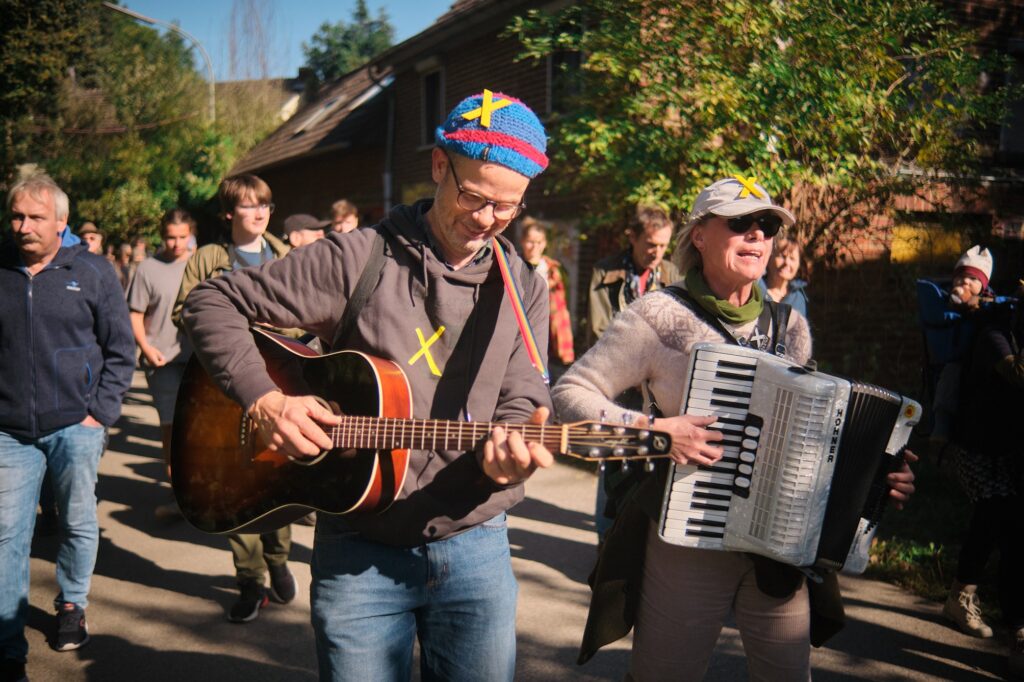
Every Sunday, activists and local initiatives invite visitors to join a demonstration called “Village Walk”. Source: Lützi Social Media Hub
This is what I see.
Lützerath is first and foremost a place of resistance and protest. But besides that, Lützerath has been a site for self-organization, political education and experimentation with alternative ways of living for the past 2 years. Although my words only represent one of the many stories lived here, but I will share with you some moments of my experience in Lützerath.
I am formulating this text just after I read your article aloud in our house up in the branches of an old oak tree. We are located less than 100 meters away from the edge of one of the world’s largest opencast lignite coal mines. My friends’ reactions to the misrepresentations involved in your article are a mix of speechlessness, amusement and shock. Besides the blowing autumn winds, we constantly hear and see how gigantic excavators swallow some of Germany’s most fertile soils in order to extract one of the dirtiest and most inefficient energy sources. Lignite coal is only about 40% efficient, even before taking into account the amount of energy necessary to resettle and demolish entire villages, build the new villages or the energy needed to dismantle and re-power windmills.
What has become our home over the past weeks and months is, like almost every night, lit up by fairy lights, filled with sounds of guitar strings, laughter and stories. We are cuddled in blankets and sleeping bags on an old, squeaky couch. Each of us is tired after another long day of engaging in different working groups ( on media, infrastructure, kitchen duties, building barricades, planning direct actions or awareness) and attending plenaries. In these regular meetings, we come together to hear each other’s ideas, needs and concerns. We discuss, decide, plan and delegate tasks. Besides running our community, we practice climbing, play games, watch political movies, and hold reading circles.
Many of us are students, others spend some hours a week working in a paid job, yet others have dedicated their entire lives to activism. We collectively organize around principles such as solidarity, sufficiency, sharing and non-hierarchic, consensus-based decision making. Most of the materials we use to build sleeping places and communal structures are either reused, repaired or recycled. Most of our food is left over from local farms, supermarkets and bakeries.
While your article instrumentalizes the image of the typically male, partisan activist, we gather around a campfire once a week to participate in reflection circles on toxic masculinity. On such nights we discuss how we can collectively prevent such behaviors from developing, both within our own circles and in situations we encounter outside of Lützerath.
While you depict the edge of the mine as a warzone between activists and security guards, we regularly visit this place to remind ourselves that we are not fighting individuals, but a powerful capitalist system. The system we fight causes ecosystem destruction, forced expropriations, climate crisis and millions of deaths, especially in places of the world benefiting the least from all the wealth accumulated. Instead of stones we send our frustration, anger and anxiety down the pit by writing our emotions on paper planes and letting them fly. Twice a week we meet for morning yoga sessions at the edge of the mine to improve our physical and emotional resilience. Instead of viewing security guards as our opponents, there have been several moments of solidarity between us. In fact, the village is consensual about treating security guards respectfully, as they are themselves often subjected to unacceptable working conditions by RWE.
You continue to create opposing camps by simplistically framing some villagers as winners and others as losers, activists as extreme and politicians and RWE as neutral negotiators. By ignoring the uneven underlying power relations, such a framing communicates a message of ‘this is just how it is’. Instead of normalizing the local and global, physical and psychological devastation caused by lignite mining, you could have acknowledged the legitimacy and the need for resistance against the continuation of decades of strategic exploitation.
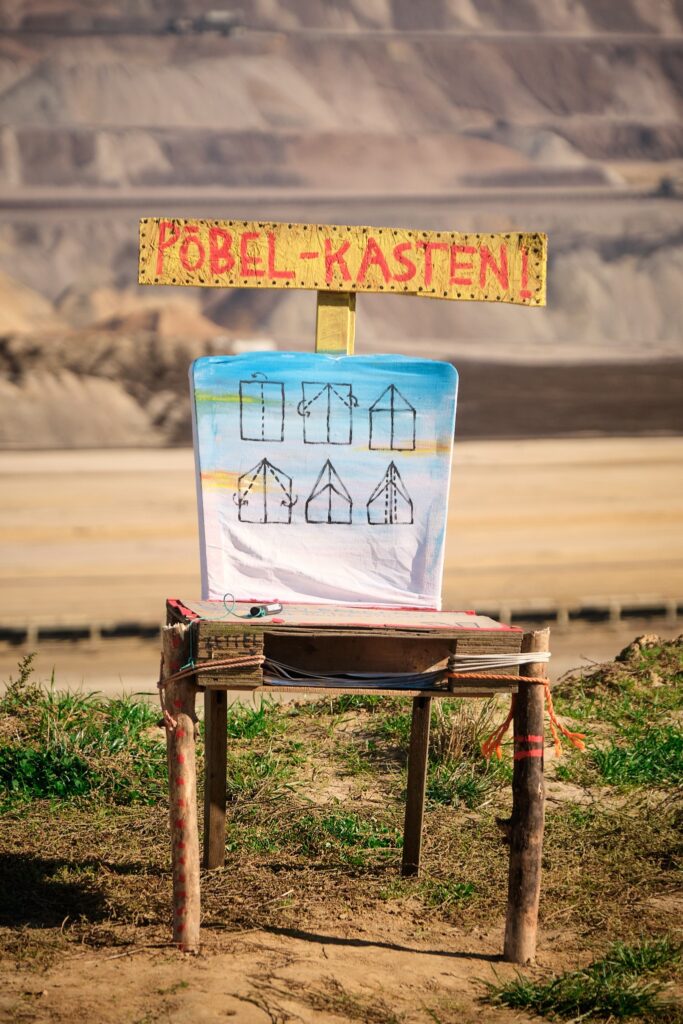
“Pöbelkasten” (swearing letterbox) at the edge of the coal mine. Source: Lützi Social Media Hub.
You do well to call out Germany’s move to exit lignite coal (not the entire coal sector) by 2030, instead of 2038, a success that ‘just doesn’t feel like one.’ In what follows, you briefly refer to the irreversible psychological and social consequences affecting villagers and local farmers after decade-long resettlement procedures and forced expropriations. You sketch their financial losses. You mention activists’ frustration, a frustration which stems from a study commissioned by Europe Beyond Coal (2022) showing the coal underneath Lützerath is not needed to secure Germany’s electricity requirements, even considering energy shortages during the energy crisis.
Yet, your words are understatements. You leave unquestioned the same arguments of ‘energy crisis,’ ‘saved villages,’ and an ‘early coal exit.’ These terms serve to cover up and justify a deal resulting from rushed, non-transparent and corrupt (or call it lobbied) negotiations between politicians of Germany’s Green Party and RWE’s CEO. Your story contributes to silencing RWE’s role in providing the data this deal is based on. At the same time as politicians hypocritically caution households to save electricity wherever they can, this deal suspends any attempt of reducing industrial activity. Reducing energy use on the level of industry would not only minimize Germany’s dependency on gas imports from Russia, but actually represent a step towards effectively reducing emissions and redistributing access to energy.
You also missed the fact that the deal includes the prolongation of two of RWE’s coal-fired power stations. This means that the demands of coal will increase in the short term, resulting in close to zero emissions saved compared to a coal exit in 2038. Contrary to being a step toward effective climate policy, this deal signifies Germany’s final farewell to staying within its 1.5 degree budget; at the same time, RWE secures profits through an increased demand for electricity, cheap CO2 certificates, and large governmental subsidies.
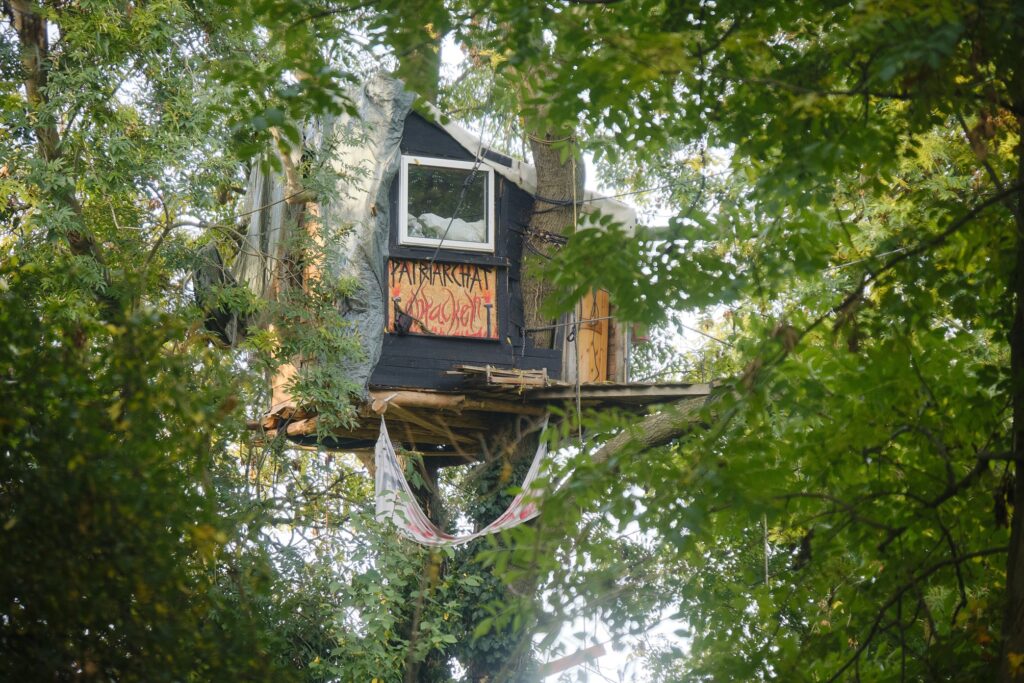
One of many the self-built homes in Lützerath. Source: Lützi Social Media Hub
Overall, you rightfully responded to a significant moment and place in the climate crisis, but you failed to do it justice. You miss the chance to critically engage with the financial and political entanglements between state actors and private corporations, between the German Green Party and RWE. As a result, your framing strengthens divisive debates that undermine public support for the climate justice movement. And you enable this division at a time where climate crisis is not a threat of the future, but already a dire reality for millions of people, like those who lost their lives and homes in the floods in Pakistan two months ago.
Of course, we are preparing to defend Lützerath during an eviction and the ways in which people will defend Lützerath will be creative, diverse and smart. But Lützerath is more than the climate justice movement’s symbol. Defending Lützerath means preventing the extraction and combustion of yet another >100 million tons of brown coal. Defending Lützerath means to reclaim land, soils and water from corporate property through living more in solidarity with each other and our living environment. By combining resistance with living, we are defending Lützerath in solidarity with and by learning from social movements of the Global South, who have spent centuries resisting colonial exploitation. I hope your next coverage of socio-ecological struggles will give greater support to people on the ground who resist and struggle for global climate justice.
Finally, this text is a call for your solidarity and support, as there will be an attempt to forcefully evict and destroy Lützerath mid January 2023. See how you can support on https://luetzerathlebt.info/
Yours kindly, Elena
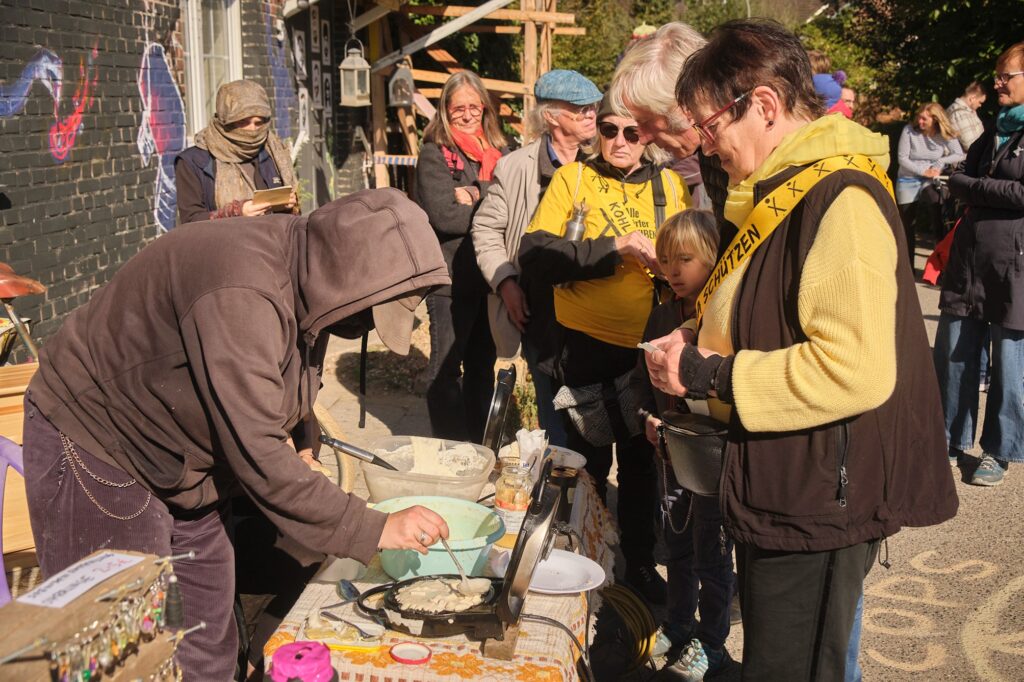
Activists baking waffles for visitors of the weekly “Village Walk” demonstration. Source: Lützi Social Media Hub.
Elena is a second year Master student in Development, Environment and Cultural Change at the University of Oslo. Currently, Elena is conducting fieldwork for her Masters thesis, among other places in Lützerath.
Top image: Climate activists protest against the Garzweiler open-cast coal mine with a sign reading “defend Luetzerath” in Luetzerath, western Germany, Friday, Oct. 1, 2021. The village of Luetzerath, now almost entirely abandoned as the mine draws ever closer, will be the latest village to disappear as coal mining at the Garzweiler mine expands. (Credit: Martin Meissner; Source: Associated Press)


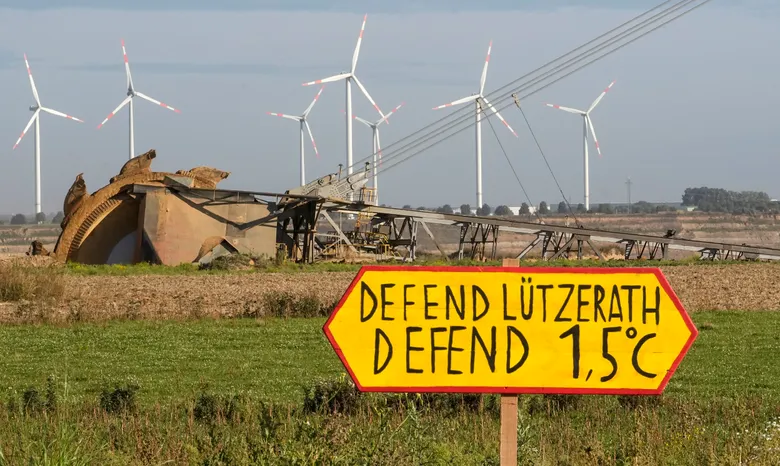

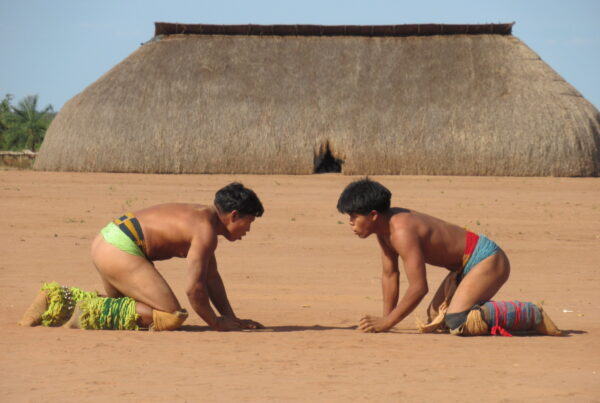
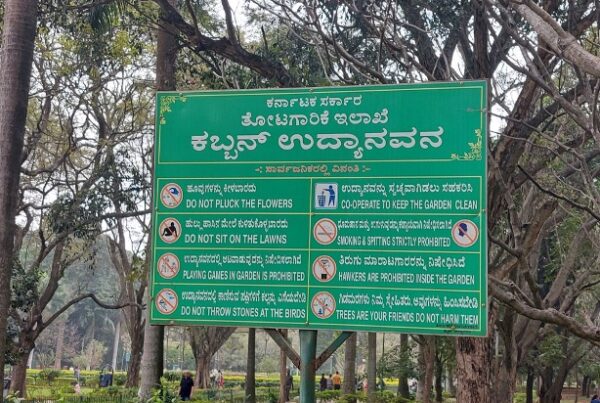
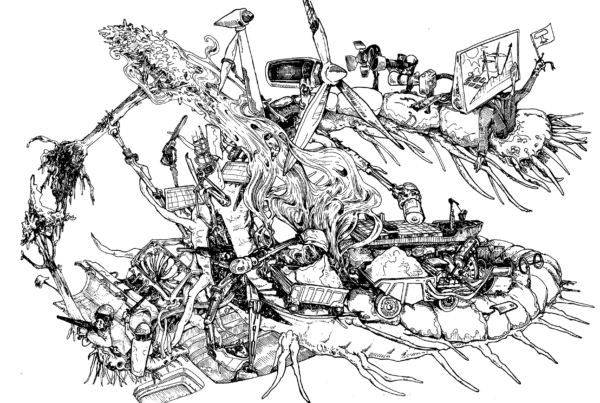

What a great text! Thank you very much for this great response with a great description of Lützerath. Very hollistically depicted! See you in Lützi!